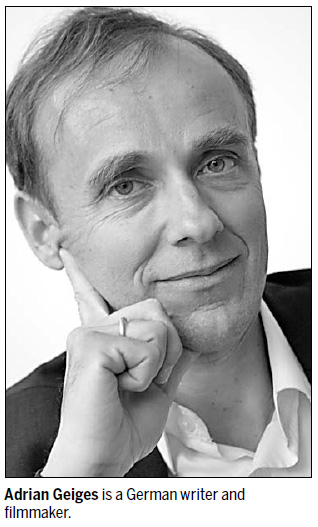Society
Angry young man's journey to a new view
By Zhao Yinan (China Daily)
Updated: 2011-06-21 07:59
 |
Large Medium Small |
Adrian Geiges was a 1980s radical but now sees the value of China's modern economic and social reform
BEIJING - When Adrian Geiges visited China in 2000, the former communist had become the CEO of a German publisher's Chinese subsidiary, the sort of "capitalist" he despised in his youth.
"Like most people nowadays, I don't care whether it is called 'socialism' or 'capitalism'. The key question is improving the quality of life," the 50-year-old writer and filmmaker told China Daily.
Nearly 20 years after he first came to China, Geiges said he believes "life is improving here", thanks to the hard work of the Chinese people and the pragmatic approach of the government.
|
 |
Geiges was among the first group of people from the then West Germany to come to China in the 1980s. During his stay, Geiges traveled around Beijing by bike, excited by the ancient Asian country opening its doors to the outside world.
His Beijing experiences are included in his autobiography My Angry Youth Time, which is an account of the changes he has undergone in the past 30 years. Geiges said his transition from a radical "professional revolutionary", who grew up in West Germany but was trained at a cadre school in East Germany, to the head of a giant "capitalist" publisher was an interesting experience.
Geiges admitted there are some similarities between his younger self and Chinese youth nowadays.
China's fenqing are angry young men and women characterized by hyper-nationalistic and sometimes anti-US sentiments.
"They tend to think in 'black' and 'white', 'friends' and 'enemies', like we, the radical left, did in the West in the 60s, 70s and 80s of the last century."
Geiges said in those days he and his comrades used to ignore any critical information about the former Soviet Union or East Germany, because they thought "it was in the interests of the bourgeois media to slam socialism".
"That might be true, but it didn't necessarily mean the information was wrong," he said.
Apart from China, Geiges has also traveled to many other countries, including Cuba, Vietnam and the former Soviet Union, where he covered the beginning of Mikhail Gorbachev's reform and opening-up policy.
His support for Gorbachev's reform program was criticized by many of his comrades in West Germany, which was the "immediate reason" for him quitting the communist party, he said.
Nowadays, Geiges said he appreciates the pragmatic approach of the Chinese leadership, saying any dogmatic socialist thinking, however well intended, will not give people the same living standards as a market economy.
As to social unfairness, Geiges said it is a side effect of economic development.
"Income gaps, to some extent, are unavoidable. But injustice and corruption have to be controlled through development of democracy, the active role of the press and the rule of law," he said.
He also said China's political system makes decisions easier and faster in the short term, but in the long term, he believes political reforms will bring more stability.
Like many of his generation who viewed capitalism as the enemy, Geiges has had to overcome many moral conflicts to become who he is today.
Recalling his experiences and the changes in his mindset, he said he doubted that radical political thinking is the best way to improve people's lives.
"In my heart I always desired and will always desire social justice and an environmentally better world," he said.
"But sometimes it is better to let it be, to live your own life peacefully without trying to force other people to do anything."
| 分享按钮 |